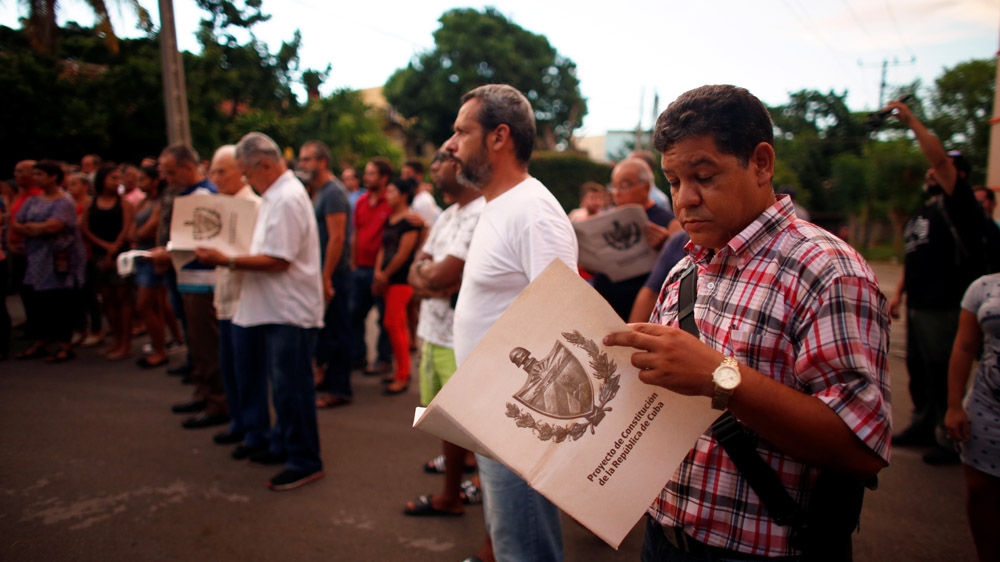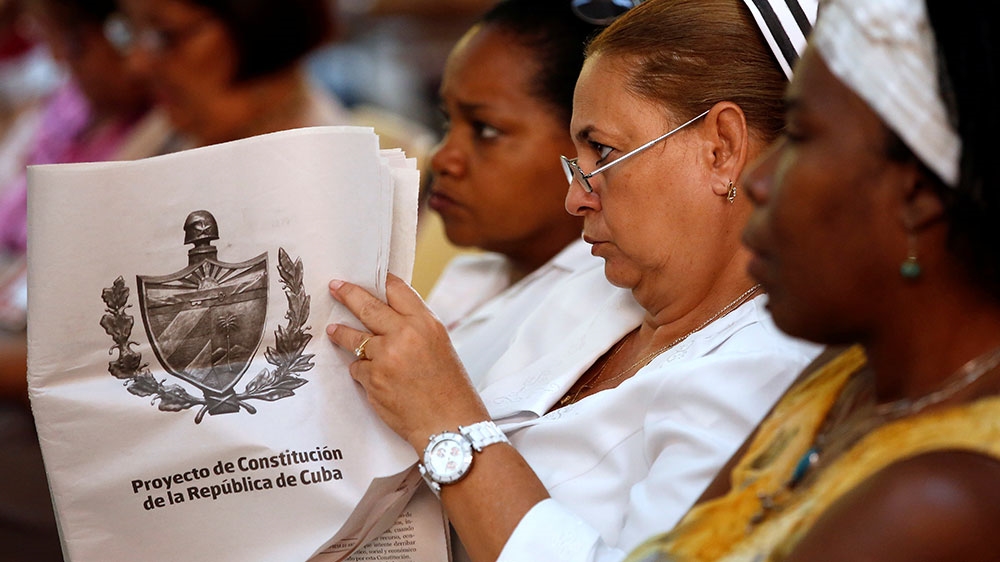Home » Latin America »
Cubans vote on new constitution to replace Cold War-era charter
Vote presents ‘unique opportunity’ to show how many Cubans voice dissent, analysts say.
Cubans began voting on Sunday in a referendum on a draft constitution to update its 1976 charter on the heels of significant economic reforms on the island over the past few years.
The new constitution, approved in the National Assembly late last year after a popular consultation, enshrines private property and promotes foreign investment. State enterprise remains the cornerstone of the economy, though the new constitution dictates state-owned companies have autonomous management.
On the political front, the document limits the president to two consecutive five-year terms, but does not open the door for Cubans to elect the president directly. The Communist Party remains the central political force in a one-party system.
Jose Jasan Nieves, editor at the non-state media outlet El Toque, told Al Jazeera by legalising economic measures put in practice in recent years, the new constitution “adapts” to a set of reforms already under way.
“This is the first opportunity the Cuban people will have in 43 years to express ‘yes’ or ‘no’ in the face of a government programme,” he said. “That is a unique opportunity because it will allow us to know what percentage of the Cuban society will start to express dissent.”
He estimated one-quarter of voters could reject the new constitution.
‘Most Cubans hoping for more’
Eight million Cubans are eligible to vote on Sunday. The polls will close at 6pm (23:00 GMT) local time. More than 225,000 electoral authorities will oversee the vote, while some 200,000 students will steward the ballot boxes.
The electoral commission will release preliminary results in a press conference Monday at 3pm local time (20:00 GMT).
“This constitution is a step forward, we cannot deny that. But I think most Cubans were hoping for more,” Camilo Condis, an entrepreneur in Havana, told Al Jazeera. “Most of the changes in the Constitution are to legalise what was already happening in the country.”
Economic reforms introduced under former President Raul Castro in 2010 and 2011 to encourage self-employment and entrepreneurship “helped to boost the private sector”, said Condis, who rents out a residence and works as a contractor for restaurants. But he added that the rollback in US-Cuban relations under President Donald Trump has created fresh challenges.
Now, he sees the Cuban government’s approach to private enterprise as an effort to “regulate but not shrink the private sector”. Close to 600,000 people are currently self-employed in Cuba, up from 150,000 in 2010.
For Maria Jose Espinosa Carrillo, director of programmes and operations at the Washington-based Center for Democracy in the Americas, one of the positive outcomes of drafting the new constitution has been the public debate that grew out of a three-month consultation process. Nearly nine million people attended public meetings to discuss an earlier draft of the Constitution, putting forward more than 700,000 proposals.
“For the first time, people had the opportunity to debate on issues that hadn’t been part of grassroots debates before,” Espinosa Carillo told Al Jazeera. “This, together with access to the internet, has brought new platforms for discussion that was previously not public.”
She expects such public debate to be an “increasing trend”, especially through new digital media outlets, Twitter, and other online platforms.
After the popular consultation, the drafting commission made 760 changes to the draft constitution, revising about 60 percent of articles in the document.
Critics say it was not clear how the commission evaluated and incorporated feedback. More than 11,000 proposals called for a direct vote for the president, for example, but the suggestion was not included in the text.
‘Space and visibility’ to tensions
Meanwhile, marriage equality sparked a debate that is likely to continue after the referendum. An earlier version of the draft constitution defined marriage as a union between two people. But the final draft sidestepped outright legalisation after evangelical protests, leaving the definition of marriage to be determined in a separate referendum at a later date.
“It created a big debate, which is positive because it gave space and visibility to tensions that are happening and that people maybe weren’t even aware of,” Maria Isabel Alfonso, professor of Spanish and Cuban studies at St. Joseph’s College, New York, told Al Jazeera.
State-led mobilisations “are progressively being replaced by these spontaneous associations and ways of thinking”, said Alfonso, creator of the documentary, Rethinking Cuban Civil Society, and cofounder of Cuban Americans for Engagement, an organisation that promotes the normalization of US-Cuba ties.
“Many of them are very emphatic that they don’t want to be in the opposition because the opposition receives, in many instances, funds from the US government,” she added.
Nieves agreed the debate is “complex and varied” beyond clear cut “yes” versus “no” or government versus opposition lines.
“These sectors – journalists, intellectuals, artists, entrepreneurs, LGBTI activists, animal rights activists, religious activists – are sectors of a thriving, growing civil society that don’t necessarily have an agenda of opposition politics, but rather of participation and defence of their respective interests,” he said.
Changes to political and social rights in the Constitution include broader recognition of freedom of thought and expression, a right to request and receive information from the state, and the ability to hold dual citizenship.
The document expands non-discrimination to include on the basis of sexual orientation and gender identity in addition to sex, gender, age, ethnic origin, skin colour, religious belief, and ability. On women’s rights, the new text guarantees women’s sexual and reproductive rights and protects women from gender violence.
Cubans living abroad also were able to submit proposals for the new constitution in the public consultation process. “That was a great step to include the diaspora,” said Espinosa Carillo.
However, other than diplomats, Cubans abroad will not be allowed to vote in the referendum unless the return to the island to cast their ballots.
Source: Read Full Article





